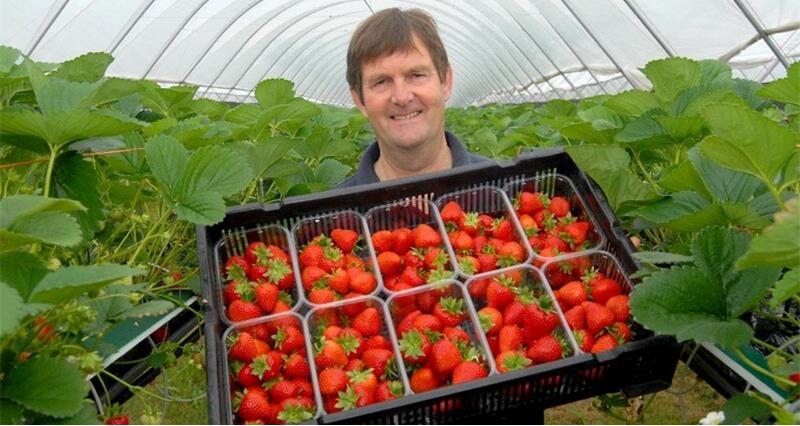I am based in South Herefordshire and farm just under 500 acres. The farm is almost all fruit – strawberries, raspberries, blackberries, blueberries, blackcurrants and redcurrants – and we farm both conventionally and organically. The organics takes up around 150 acres.
We aim to follow as many sustainable and climate-friendly practices as possible on farm. In addition we do a lot of work to manage pests and disease organically by working with the crop culture and pruning.
Table-top production
To improve our productivity, which is a key component in reducing our GHG (greenhouse gas) emissions, we grow our fruit on table-top platforms instead of in the soil at ground-level.
The tables are under polytunnels, which are on permanent pasture and the plastic is 100% recycled. We try to avoid as much waste as possible by using these polytunnels for 4-5 years until broken or inefficient.
Growing on table-tops helps with better crop production and yield by reducing weeds, pests and disease.
We have also chosen a specific growing media which again, helps to avoid diseases and pests that may usually be found in the ground.
“To anyone thinking about making some changes on farm, a combination of sustainable and environmental care and attention to detail really isn’t too financially demanding on your business.”
Anthony Snell, Fruit Grower of the Year 2022
We also use a trickle irrigation system which makes us 50% more efficient in our water application. This system can also be used when we want to apply fertiliser, again making us much more efficient, ultimately increasing productivity and reducing costs.
If there are any pests, we use bio-control measures rather than artificial, and the 300 acres of blackcurrants (50% of which are organic) are grown with weed control by a unique water weeder which replaces herbicides.
Maintaining carbon stores through hedgerows and trees
We have many stores of carbon on farm, we have around 17km of hedgerows on farm, areas of woodland, and wildflower meadows.
A small herd of 15-20 Hereford cattle also helps with our soil health; they live outdoors all year in the organic grassland and poplar woodland area.
We also have lots of bird boxes on farm; we were really pleased to have 32 species of bird identified on farm when we did the Big Farmland Bird Count this year!
Cutting costs and increasing self-sufficiency
Installing renewable energy sources has helped us cut costs and increase our self-sufficiency.
While it was a large upfront investment, we have put up solar panels to generate 370kw of electricity, decreasing our electricity bills by 35%.
This works really well for us, as it contributes to the running of our cold store and freezer in the packhouse, staff accommodation and our irrigation systems in the polytunnels. It definitely has helped us save money in the long run.
In order to avoid as much waste as possible (alongside reusing our polytunnel plastic as much as possible), we freeze any surplus fruit.
Likewise, any fruit that that is of poorer quality is taken to a local farmer with an anaerobic digester – we don’t receive any payment for this, but at least our fruit is generating energy.

We chose these climate-friendly farming practices for market benefits. Not only do these practices save us money (especially in these challenging times where the prices we are paid for our produce are low but inputs are incredibly high) and make us more productive, but it also helps with our market access.
To anyone thinking about making some changes on farm, a combination of sustainable and environmental care and attention to detail really isn’t too financially demanding on your business. In fact, we hope that it will increase our market access both in the UK and abroad, granting us bigger rewards than before we made these changes.
Overall, I really enjoy growing food, which is not only healthy for the nation, but also growing food in a way that is good for the planet and my bottom line!
Improve your business resilience
Many of the climate-friendly actions that Anthony has taken to improve his GHG (greenhouse gas) footprint and business resilience can be found in the NFU Horticulture and Potatoes Resilience Plan.
Climate-friendly farming is good for business; it can help members achieve better market access, cost reductions, business resilience and consumer approval, alongside reducing greenhouse gas emissions.
The resilience plans set out in one place what could be achieved based on what we are asking the government to do for farmers and growers.
Each sector is defining its own priorities, highlighting the member benefits and associated challenges, alongside the support needed from the government, industry and research and development in order to increase uptake of climate-friendly farming.

